Education
CEES Orientation 2025: Students tipped on academic excellence, setting goals and development of work plans
Published
6 months agoon
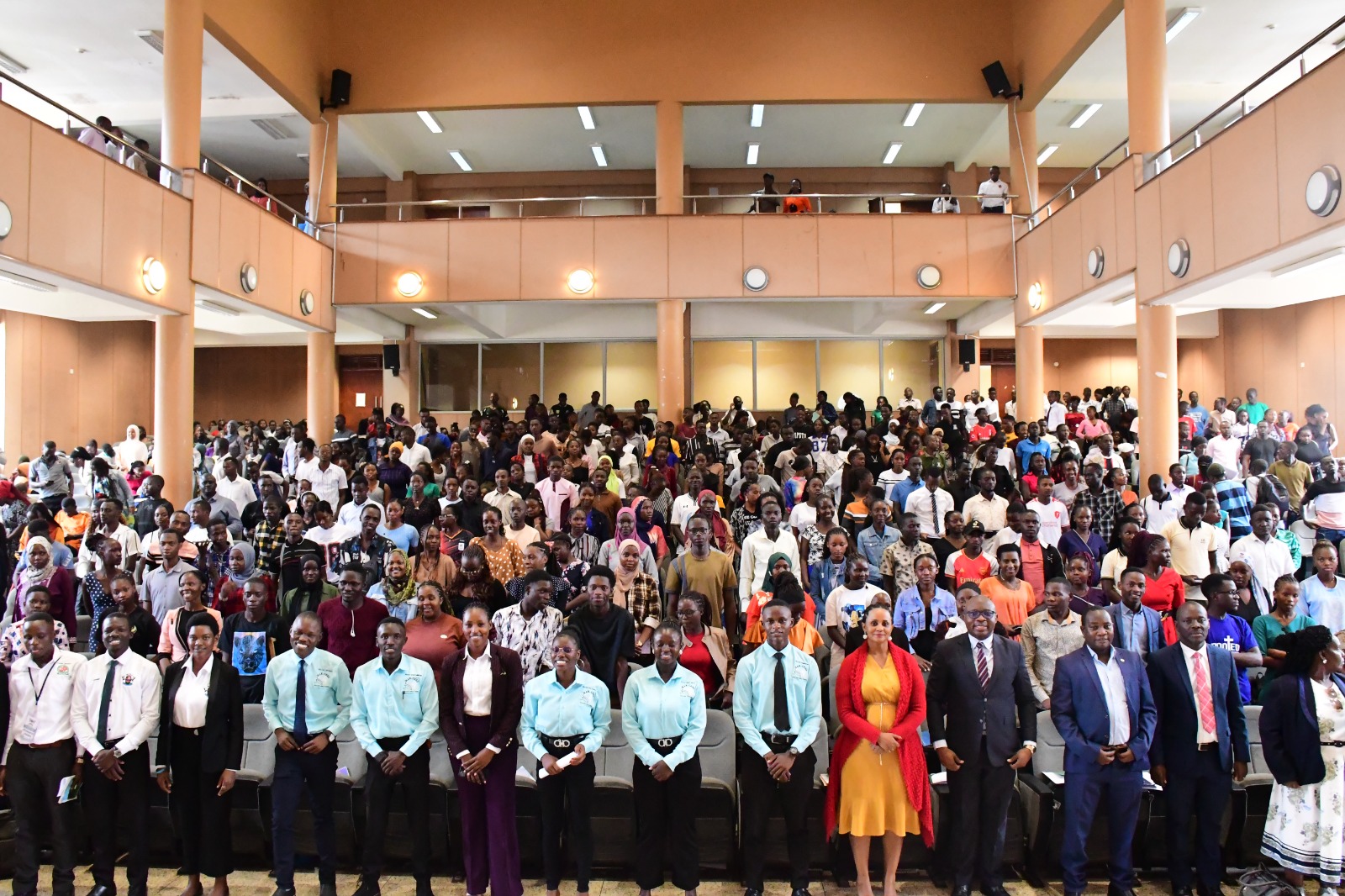
On 6th August 2025, the College of Education and External Studies (CEES) held a lively orientation ceremony to equip new students with the requisite knowledge required to gain a deeper understanding of the College structures, academic programmes, services, and, its contribution to the University’s core functions of teaching and learning, research and innovations, knowledge transfer partnerships, and community engagement.
The College consists of three (3) schools namely, the School of Education, the School of Distance and Lifelong Learning, and the East African School of Higher Education Studies and Development. The College wide orientation brought onboard first year students from the respective Schools who filled Makerere University Yusuf Lule Central Teaching Facility Auditorium and its gallery to the brim.
Organised by the College Administration, the 91st College Guild Council (CGC), and student leaders at the College, the Orientation featured presentations from the Office of the Principal, Dean of the School of Education, Dean of the School of Distance and Lifelong Learning, College Registrar, College Bursar, College Librarian, College Communication Office, College Chief Custodian, Makerere University Counselling and Guidance Centre, and Directorate for ICT Support (DICTS). The students also listened to highlights from student leaders, presentations on Safeguarding, the Emerging Leaders Program, and participated in an interactive question and answer session.
The College Principal, Prof. Anthony Muwagga Mugagga represented by the Deputy Principal, Prof. Ronald Bisaso, congratulated the new students upon joining Makerere University, a renowned hub for academic excellence, research and innovations.

Citing the ongoing implementation of the competence based education in Uganda and beyond, the College Principal challenged the new students to study the trends in order to tap into the opportunities and networks. He advised the students to re-position themselves as a new breed of teachers, professionals and change agents focused on societal transformation by positively impacting learners.
“You have joined the College, at a time, when the Government of Uganda through the Ministry of Education and Sports, the National Curriculum Development Centre, Makerere University, and other reputable partners, are implementing Competence Based Education (CBE) at the Secondary levels, national teacher training institutions, and at the university level. You should position yourself to play a central role in the delivery of competence based education at the different levels of the education system,” he stated.
The Principal urged the new students to concentrate on academics, build positive networks, form discipline specific discussion groups, actively participate in College and University-wide activities.
Speaking in his capacity as the Deputy Principal, Prof. Bisaso outlined three (3) pillars that would enable the first year students to excel in academics. “If you wish to earn your degree and graduate with excellent grades, prioritize classroom learning, independent research and practical internships. This should be coupled with maximum engagement in learning, regular attendance and meeting of set deadlines,” said Prof. Bisaso.
Convinced that quality education begins with quality educators, the Deputy Principal guided students to invest time and resources to become quality teachers. He counselled them to embrace digitalization and e-learning, seek mentorship from those who have excelled in life, acquire professional skills, and adopt acceptable societal values and standards.
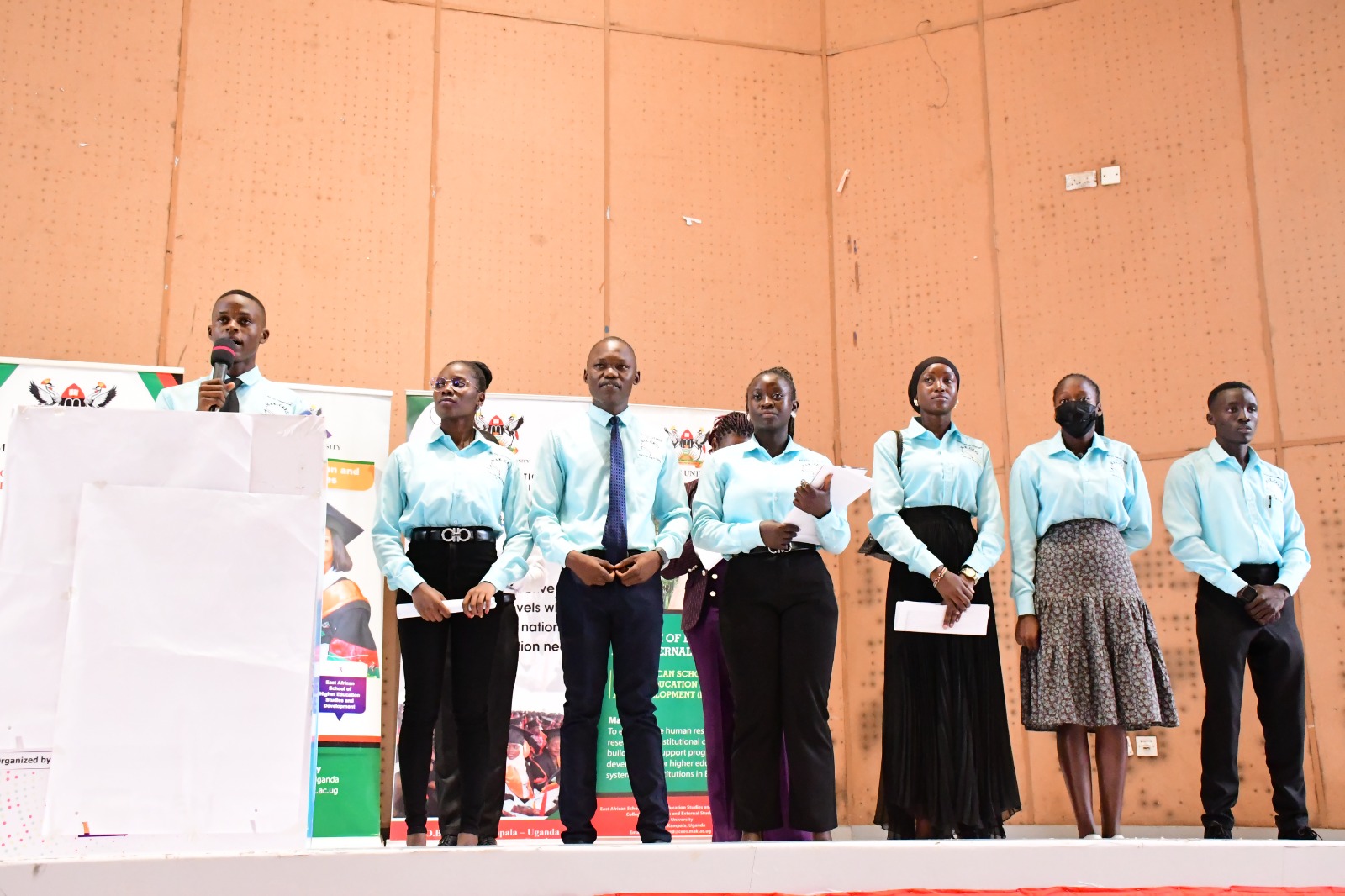
Prof. Bisaso encouraged the new students to take on leadership positions within the College and at the University level. “I recognize the College Guild Council, Makerere University Education Students Association (MESA) and other structures within the College that present our students with leadership opportunities. I charge you to take on leadership positions such as Class Representative, Discipline specific association leadership slots, among others. You should be a holistic student gifted in academics, leadership and other aspects of life at campus,” he remarked.
In the same vein, he recognized the Chairperson of the 91st College Guild Council (CGC), Hon. Samuel Asingya and his team, student associations such as MESA, for working in partnership with the College administration to host a successful orientation ceremony.
Delivering his remarks, the Dean-School of Education, Associate Prof. Mathias Mulumba Bwanika notified the first year students that Uganda needs educators who will inspire the future workforce.
Emphasizing the importance of attaining a good class of degree, Associate Prof. Mulumba Bwanika said: “Admission into the University is only the start – the real challenge is graduating with a degree that reflects your true potential.”
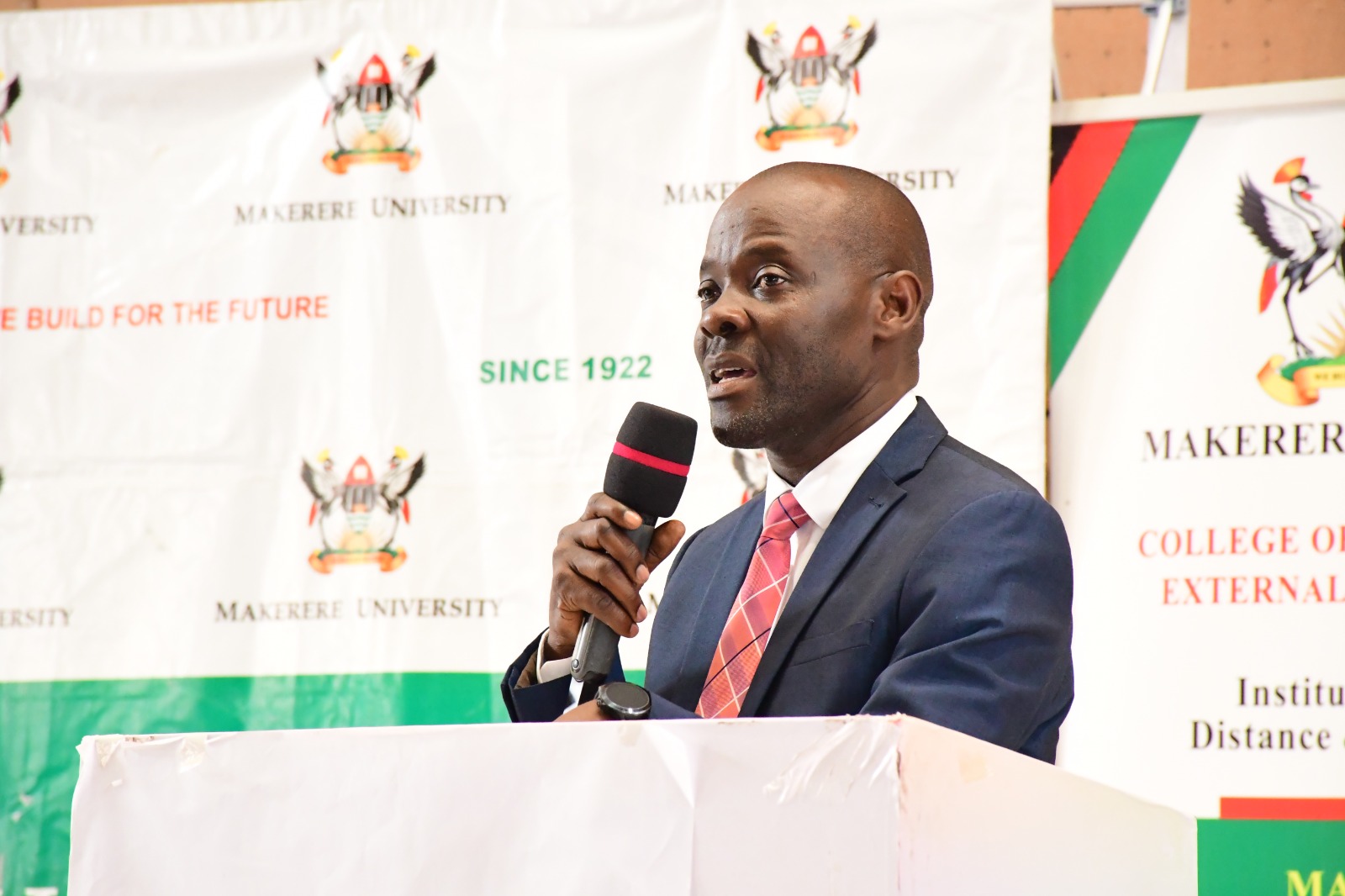
To achieve the desired outcome, Associate Prof. Mulumba Bwanika advised the students as follows: “You should have a work plan. Plan your day, week and semester. Attend all your lectures, read ahead of your lecturer, undertake research on different topics, form discussion groups, be punctual and disciplined.” He encouraged the first year students to consult and engage the Heads of Department, Subject and Program Coordinators, the College Administration and student leaders.
Tasking the students to consider joining the academia (teaching staff), research and the administrative arms of the University in future, he reminded the audience that he too was once a student. He testified that he was one of those students who focused on academics, and over the years, he is reaping the fruits of hard-work, discipline, and resilience.
He re-affirmed Makerere University’s zero-tolerance for sexual harassment, when he said: “No student should feel pressured to compromise their values. I request you to read the Policy and Regulations against sexual harassment, and the Makerere University Safeguarding Policy.”
Highlighting Makerere University’s strong academic support systems, the Dean, School of Distance and Lifelong Learning, Dr. Harriet Nabushawo, urged the students to effectively utilize the teaching and learning facilities in their academic pursuits. She reported that the School houses the Department of Open, Distance and e-Learning, which is championing e-learning and digital pedagogies.
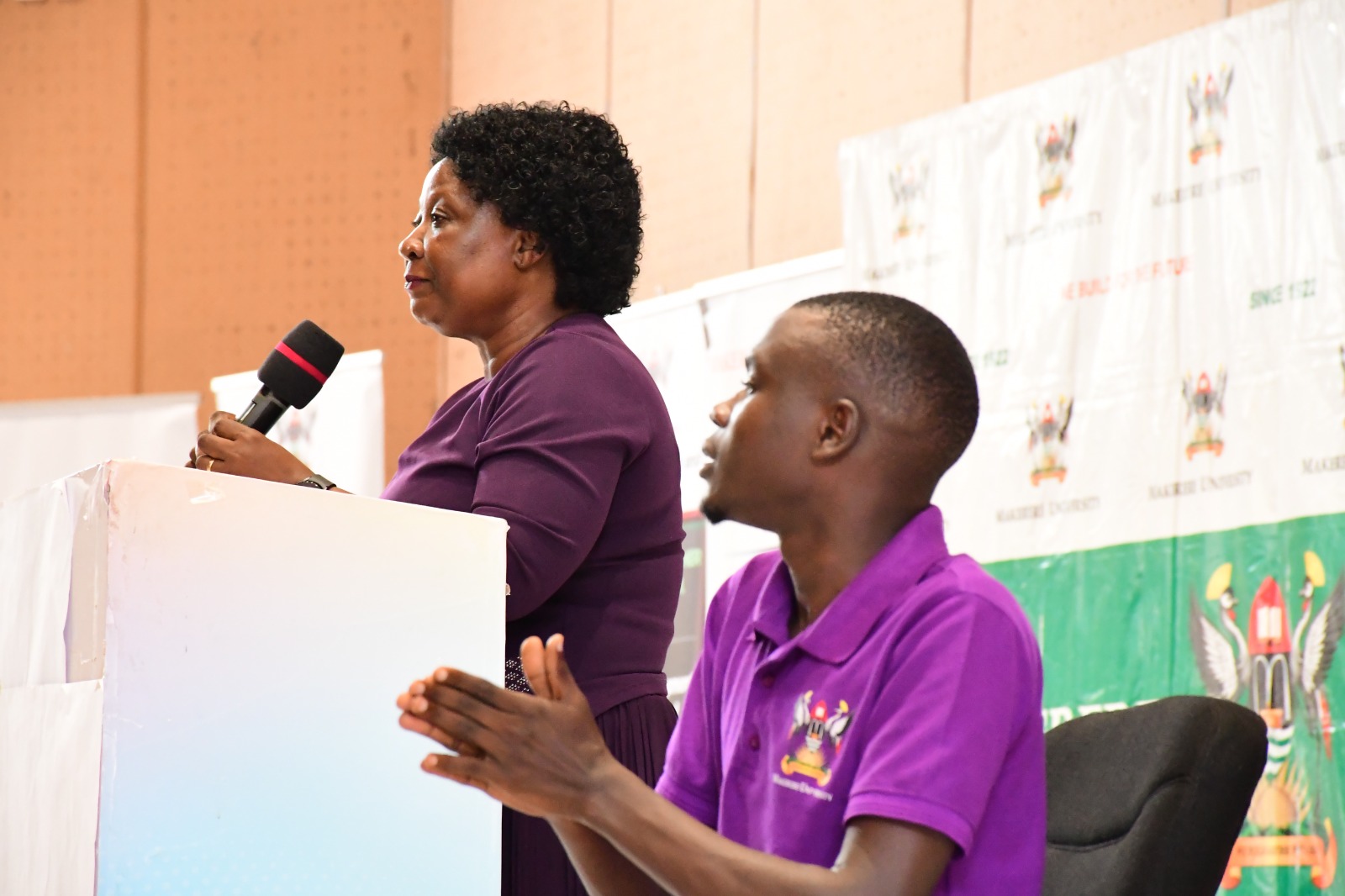
The Dean mentioned that the School prioritizes student affairs through an open communication approach, involvement and engagement. She called upon students to have a positive attitude towards voluntary work, and cited Mr. Oscar Kizito, who accepted to volunteer at a very short notice, to provide sign language interpretation services at the orientation. She noted that this gesture alone had made him known to a wider audience, who wouldn’t hesitate to recommend his sign language interpretation services, when the opportunity arose. Dr. Nabushawo therefore called upon students to seize every opportunity and get the best out of it.
Representing Mr. Henry Nsubuga, the Deputy Chief of Counselling and Guidance Services, Ms. Rosemary Nalwanga, a Senior Counsellor, implored the students to have a sense of purpose. “Life is more than a degree. You need to learn other skills outside your degree. Be cooperative,” she guided.

On the issue of building positive relationships, Ms. Nalwanga advised students to acquire good friends. “Positive friends impact your future,” she stated.
Ms. Nalwanga explained that the Counselling and Guidance Centre exists to ensure that the emotional wellbeing of students is catered for. “I advise you not to take drugs. If you have any fears that you have failed to control, please come to Makerere University Counselling and Guidance Centre.”
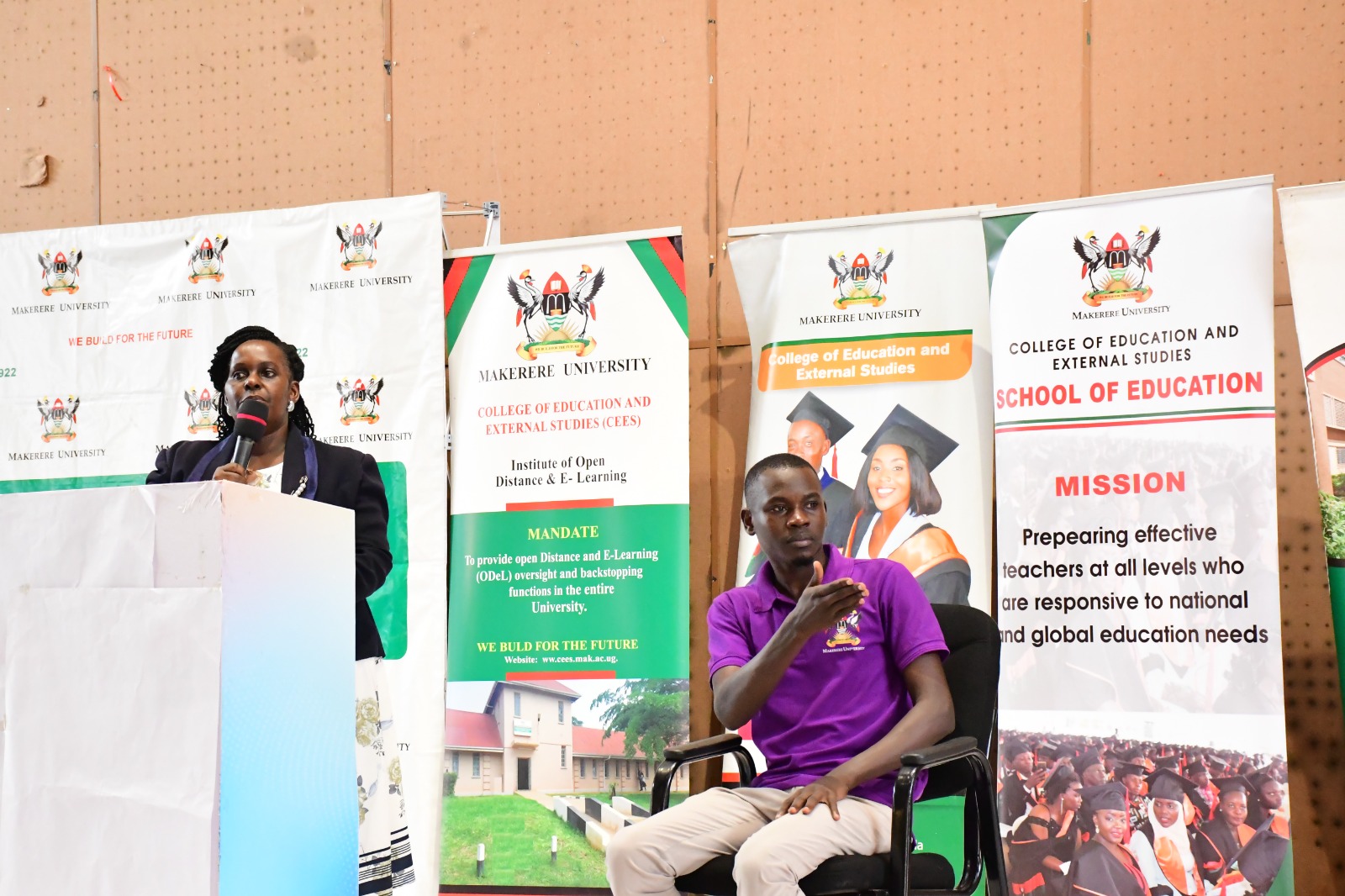
Delivering her remarks, the College Registrar, Mrs. Joanna Kayaga Kiwana introduced the School Registrars present namely Ms. Molly Nantongo and Ms. Sandra Ampiire. The College Registrar tipped the first year students on academic policies, registration procedures, change of course guidelines, among other key aspects. She underscored the importance of timely registration. “Without registration, you are not an eligible student. You need to fulfill the registration procedures in order to access university services and facilities. Based on her experience, Mrs. Kayaga Kiwana reminded the students that their academic journey involves planning, discipline, listening to words of wisdom, holding on to your faith and being prayerful.
Ms. Ritah Namisango, the Principal Communication Officer, implored the students to participate in college events/functions, be goodwill ambassadors of the College, navigate the College website (https://cees.mak.ac.ug), and follow the College Social media pages, to be specific on X (formerly Twitter) on @MakCEES.
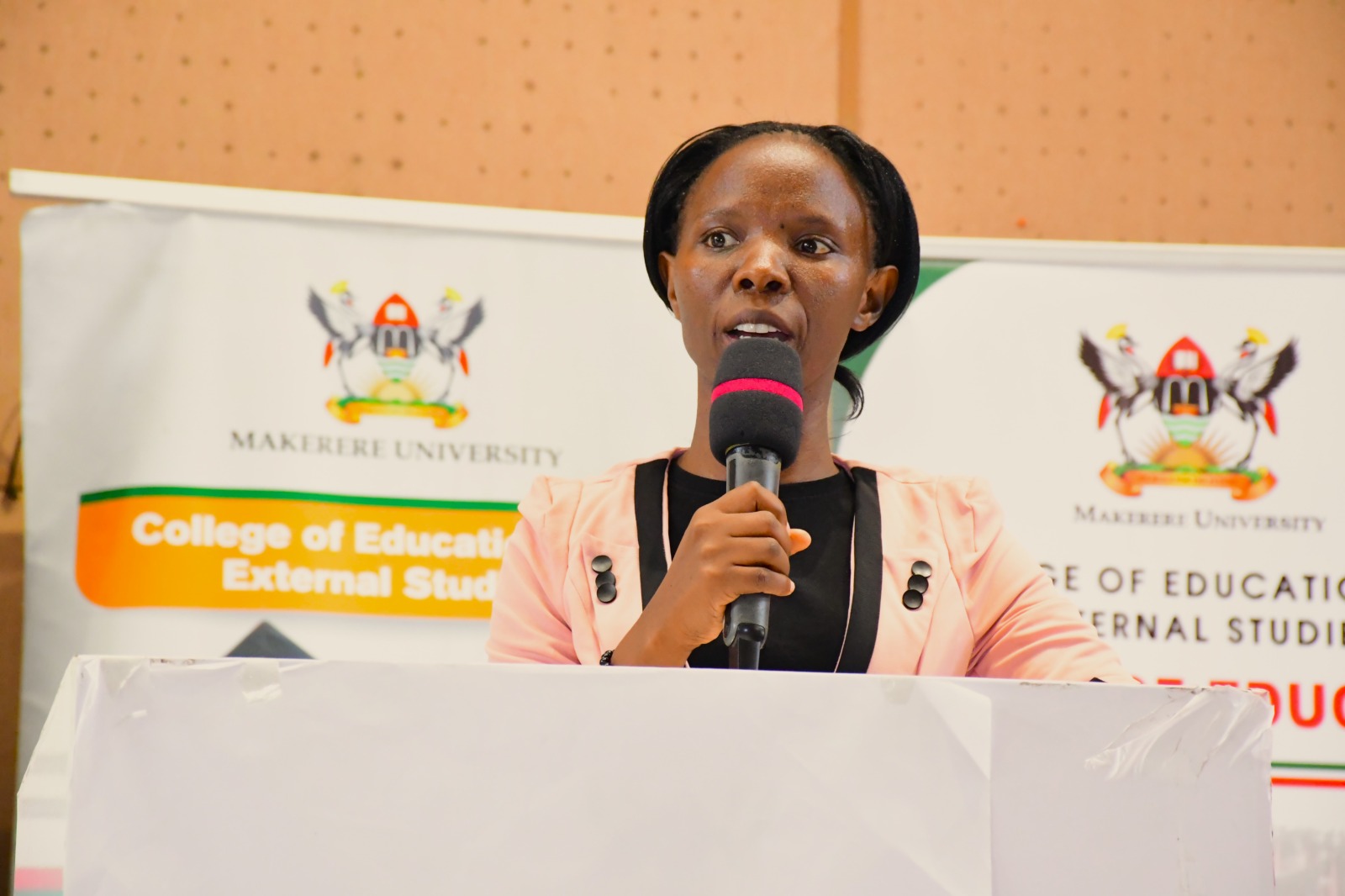
The College Bursar, Mr. Stephen Kayima, represented by Mr. Godfrey Wasikye sensitized students on the financial policies and payment guidelines. He appealed to students to adhere to the Fees Policy and the stipulated timelines. He stressed the need to document and keep a record of financial transactions during one’s academic journey, and urged the students to always consult the office of the College Bursar regarding financial obligations to the University.

On behalf of DICTS, Mr. Yunusu Musisi briefed the first year students on the different online academic and support systems. He appealed to the students to embrace digitization in order to utilise the systems. Mr. Musisi informed the students that the online systems are accessible and convenient. He requested them to always follow the social media platforms run by DICTS for instant messages including videos guiding students on how to use the particular systems such as the Makerere University e-Learning Environment (MUELE).
“MUELE helps students to access course materials, participate in online discussions and submit academic assignments virtually. The Makerere University students’ portal provides a platform for students to register, enroll for the semester, and keeps track of the students’ academic progress,” he reported.
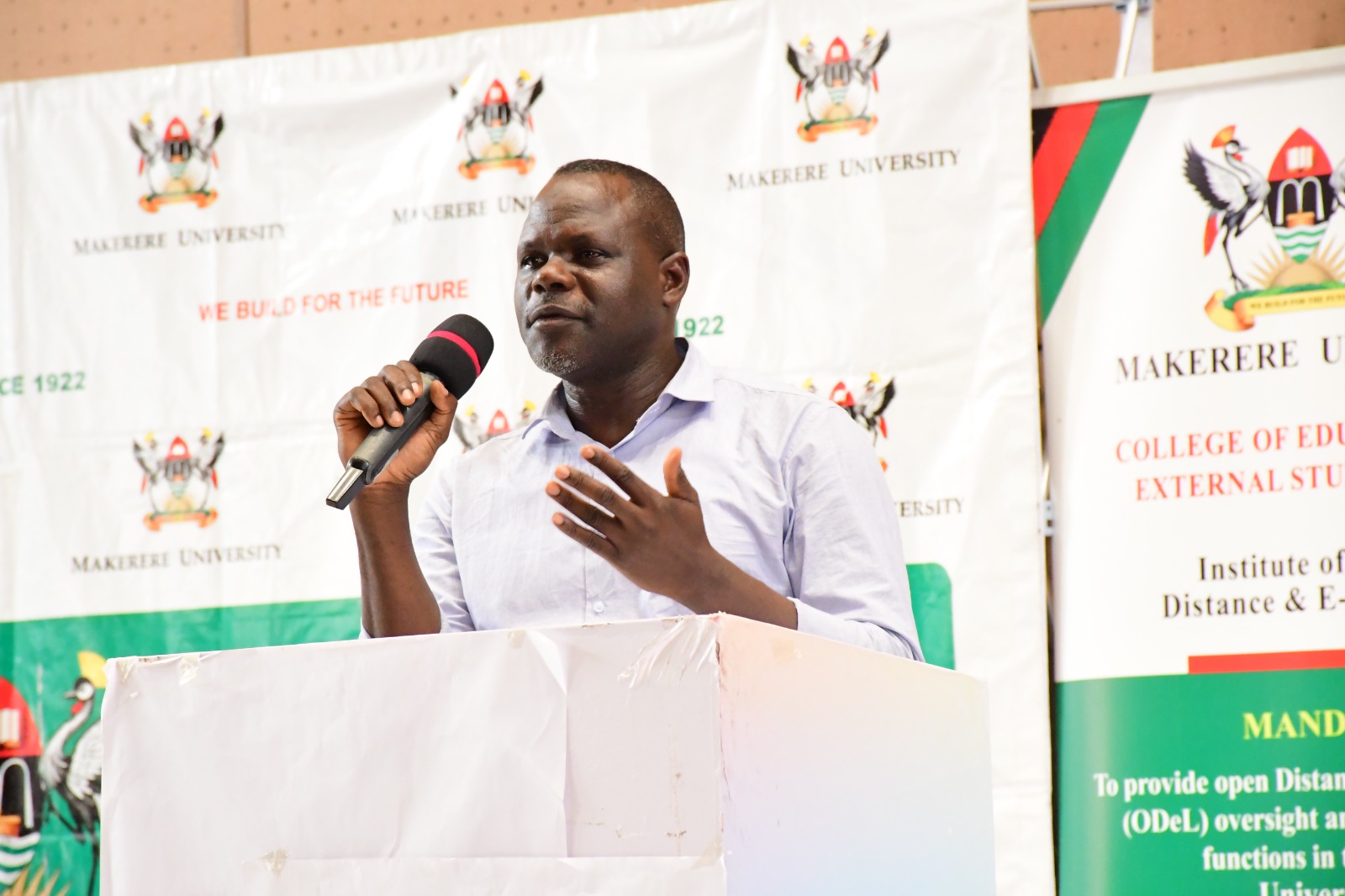
On safety and well-being while on campus, Dr. Michael Walimbwa, a Senior Lecturer at CEES, and a Safeguarding Champion, described safeguarding as a means of protecting yourself and others from harm, exploitation and abuse. Safeguarding, he noted, stands for being safe, informed and empowered. Dr. Walimbwa tasked the students to read the Makerere University Safeguarding Policy, and to always report safeguarding concerns to the respective offices and safeguarding champions.
In her remarks, the College Librarian, Ms. Grace Akello presented the wide range of library services at the College. Regarding library users with special needs, Ms. Akello stated that the library team ensures that a member of staff is designated to provide sign language interpretation services.
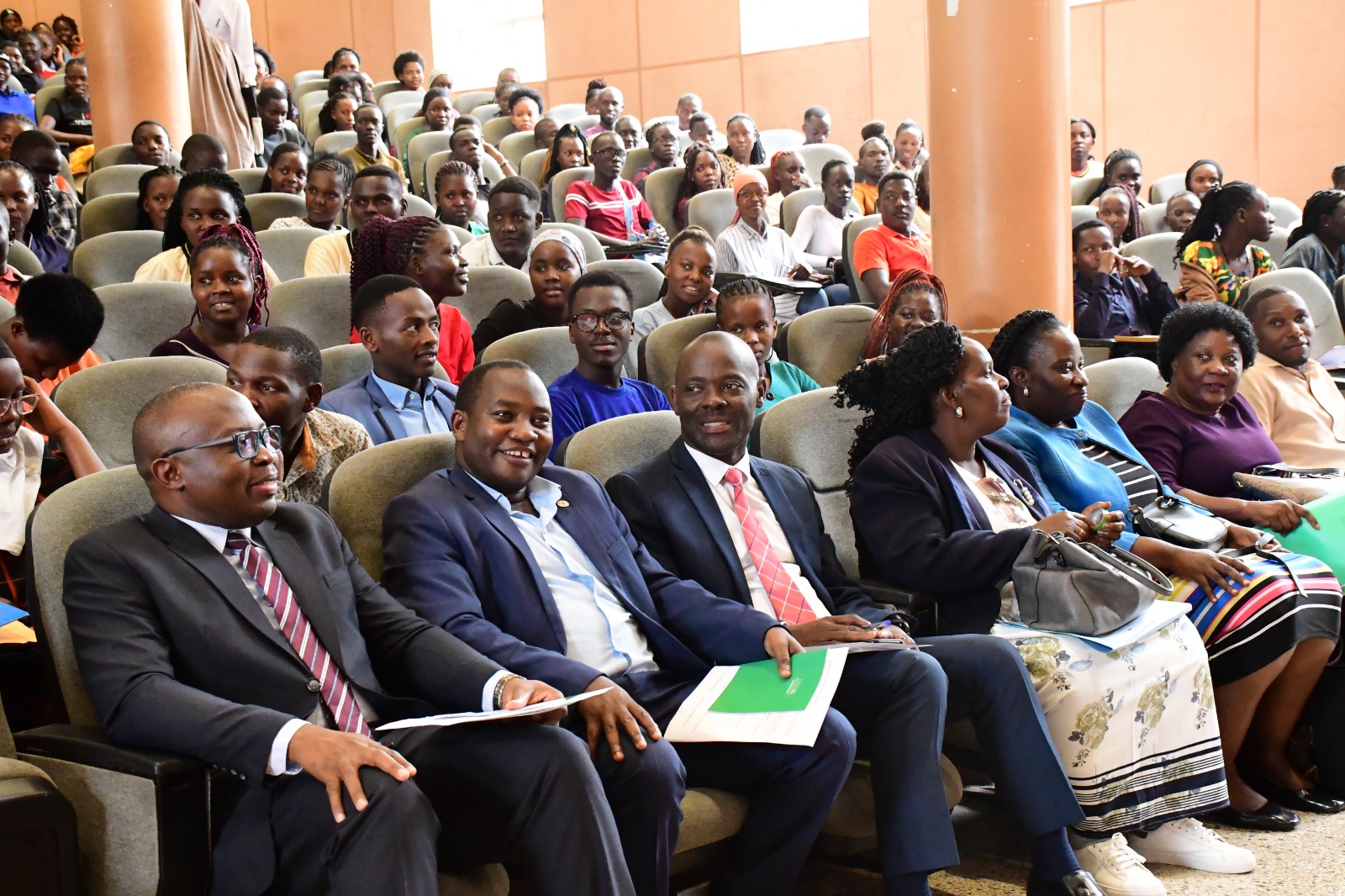
The Chief Custodian, Ms. Agnes Nambuya emphasized handling University property entrusted to students during their studies with care. She requested the students to notify the Office of the Principal as well as the Chief Custodian, on matters pertaining to facilities and university property.
Presenting the Emerging Leaders Program (ELP) framework and its benefits, Ms. Laeticia Asasira and Hon. Miracle Nassazi sensitized students on character, leadership, values and embracing a purpose-driven lifestyle. They rallied students to participate in the short trainings and activities organized by the ELP in order to be grounded in leadership, ethics, character building and formation.
The following university staff participated in the orientation ceremony: Prof. Ronald Bisaso-Deputy Principal, Associate Prof. Mathias Mulumba Bwanika-Dean of the School of Education, Dr. Harriet Nabushawo-Dean, School of Distance and Lifelong Learning, Mrs. Joanna Kayaga Kiwana-College Registrar, School Registrars (Ms. Molly Nantongo and Ms. Sandra Ampiire), Dr. Michael Walimbwa-Senior Lecturer, Mr. Vincent Muwonge-Coordinator BECE, Ms. Ritah Namisango-Principal Communication Officer, Mr. Emmanuel Lubega-Office of the Principal, Ms. Rosemary Nalwanga-Senior Counsellor, Mr. Godfrey Wasikye-Office of the College Bursar, Mr. Yunusu Musisi-DICTS, Ms. Agnes Nambuya-Chief Custodian, Ms. Grace Akello-College Librarian, and Mr. Moses Kibirango-Web Administrator.
The proceedings of the CEES Orientation were moderated by Ms. Ritah Namisango-Principal Communication Officer, assisted by student leaders namely Hon. David Ocola and Hon. Kenneth Mbabali.
You may like
-
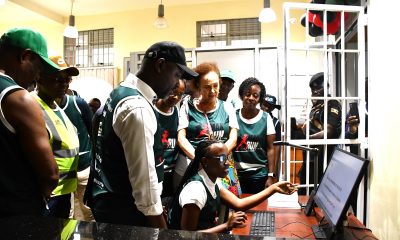

Students empowered to thrive through the Semester
-
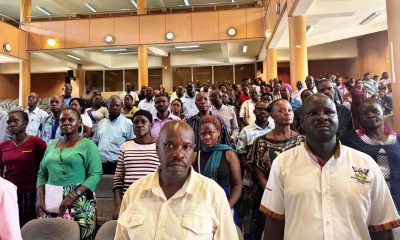

Support Staff Trained to Promote Safety of Students and Stakeholders
-
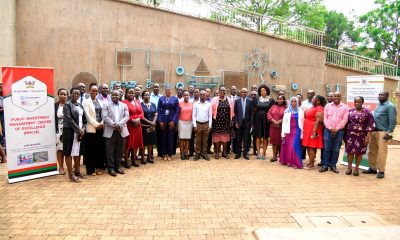

Makerere Hosts Second Cohort of MoKCC&MA Procurement Officers for E&S Safeguards Training
-
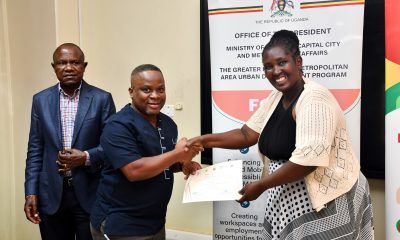

PIM Centre Awards Certificates to MoKCC&MA Officers after Safeguards Training
-
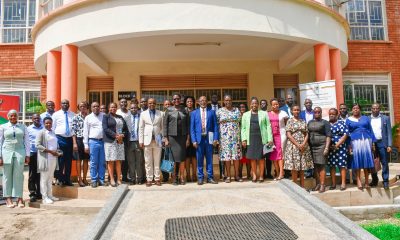

VC Opens Training for MoKCC Officials on Safeguards in Procurement
-
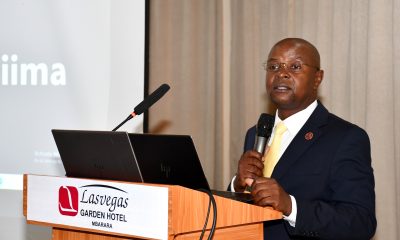

Building Skills for Better Public Investments: PIM Centre Trains Public Sector Economists
Education
Facilitating Access and Participation through Higher Education Access Programmes and Connected Education for Students with Refugee Backgrounds: A Global South Delphi Study
Published
2 months agoon
December 19, 2025
On 17th December 2025, a Delphi workshop was convened at Kampala Kolping Hotel, providing a collaborative platform for dialogue on standardisation and harmonisation of Higher Education Access Programmes (HEAP) across institutions, alongside strategies for portability and verification on demand through a HEAP Digital Passport. Discussions centered on accreditation, diversification of delivery and learner support, and future scenarios for HEAP and Connected Education.
Expert panelists underscored the urgent need for:
- Standardised HEAP frameworks across universities to ensure consistency in admission pathways.
- Harmonisation of HEAP curricula, duration, and procedures to eliminate barriers that hinder access and transition.
- Development of a HEAP Digital Passport enabling portability of credentials, secure digital verification, and integration with national qualification frameworks and international recognition systems.
Uganda, is one of the leading refugee-hosting countries with inclusive education policies, faces challenges in ensuring equitable access and participation for students with refugee backgrounds. While some universities offer HEAP as a bridging programme for marginalized learners, variations in programme design, delivery, and support systems still exist, which may lead to violations of accreditation. This calls for urgent standardisation and harmonisation to strengthen HEAP as a recognized transitional pathway into higher education.

Funded by Education Beyond Borders, researchers from Makerere University and the University of Edinburgh engaged stakeholders from public and private universities in Uganda through participatory workshops and expert meetings. This Delphi Workshop aimed providing a collaborative platform for dialogue on standardisation and harmonisation of Higher Education Access Programmes (HEAP) across institutions, alongside strategies for portability and verification on demand through a HEAP Digital Passport. Discussions centered on accreditation, diversification of delivery and learner support, and future scenarios for HEAP and Connected Education. The project is led by Dr. Rovincer Najjuma (Principal Investigator), with co-PIs Dr. Rebecca Nambi and Dr. Michael Gallagher.
Listening to experiences and co-creating solutions

Opening the workshop, Dr. Rebecca Nambi, a Senior Lecturer at Makerere University and Co-Investigator of the project, emphasized that the engagement was not about formal presentations, but about listening to experiences of students with refugee backgrounds that have accessed Higher Education using the HEAP programme and co-creating solutions with Expert Panelists.
Highlighting the persistent disparities in refugee participation in higher education, Dr. Nambi explained that while global and national efforts often focus on primary and secondary education, higher education remains critically under-supported. Drawing on years of research, she observed that refugee participation in higher education has historically stood at three percent (3%), later improving to about seven percent (7%), leaving the highest number of refugees excluded.
“Where do they go if they do not transition to higher education?” she asked. “Who supports them and how do institutions respond when learners arrive with disrupted educational trajectories?”
Shift from mere documentation of marginalization and adversity to practical interventions
Dr. Nambi underscored the importance of moving beyond research that merely documents marginalizationa and adversity. She advocated for practical interventions that improve systems for people with refugee backgrounds and strengthening education for host communities. “Addressing refugee education is part of a broader global agenda shaped by migration, conflict, and labour mobility in several countries.”
Dr. Nambi emphasized that HEAP provides a legitimate pathway for students with refugee backgrounds, and the ongoing adjustments aim to align the program with national standards and student needs.
Central to the discussion was the concept of connected learning, which promotes flexible, blended, and digitally supported education pathways that link learners across institutions, resources, locations, and systems.
Referencing the Makerere University E-Learning Environment (MUELE) as a key enabler of digital and interactive learning between lecturers and students at Makerere University, Dr. Nambi urged other universities to explore such a digital approach to catalyze the delivery of HEAP programmes. She noted that connected education is not solely about technology, but about harmonization, recognition, and collaboration among universities and regulators.
Comparing public and private universities, Dr. Nambi observed that private universities often have more flexible access pathways, and urged that documentation of students’ experiences of HEAP is critical to understanding gaps in provision, delivery and support
“Much of our work has involved examining how Makerere University and other universities are handling access for vulnerable students. We want to document lived experiences, analyze what is working and what is not, and generate evidence that can inform policy and institutional practice,” Dr. Nambi explained.
HEAP Emerging Challenges, lived experiences and future
Moderating one of the key sessions, Dr. Rovincer Najjuma, the Principal Investigator and a Lecturer in Digital Education and the Global South at the University of Edinburgh, guided participants through delphi workshop activities; these included engaging panelists in articulating expectations, uncertainities and risks, and developing future scenarios for HEAP accreditation, diversification of delivery and support and connected education.

Using participatory methods, participants shared insights through post-it notes and group reflections, capturing perspectives from expert panelists, HEI administrators, and students with refugee backgrounds. Dr. Najjuma encouraged an open dialogue, ensuring that student voices, particularly those with refugee backgrounds were centred in the conversation by encouraging them to share their experiences and journeys of participating in HEAP programmes.
The panelists acknowledged that while the HEAC has changed the nomenclature from HEAC to HEAP, programmatic provisions need to evolve, to address the inconsistencies that remain with respect to how institutions implement HEAP, duration, curriculum, and transfer of HEAP credit across institutions. Panelists shared about the critical gaps in awareness, mentorship, orientation, and institutional readiness to implement HEAP in ways that support refugee learners effectively.

On the issues faced by students with refugee status, participants identified several recurring challenges affecting access to and participation in higher education. These included low awareness of the HEAP programmes, fragmented and uncoordinated information dissemination, and difficulties in credential recognition and transfer across institutions and country host-country education systems.
Students highlighted low self-esteem, identity struggles, and stigma, especially where access programmes are perceived as inferior to Advanced High School Certificates. They also cited financial barriers, limited digital access, mental health challenges, and lack of learner-centred teaching approaches.
Key outcomes from the workshop
Panelists outlined key expectations to strengthen access and participation, which included the development of a standardized national HEAP curriculum, with clear and uniform entry requirements, and seamless credit transfer across institutions and host countries, facilitated by the development of HEAP Digital Passport.
Mentorship emerged as a cornerstone of learner support, alongside extended orientation programmes, life skills training, and entrepreneurial education. Participants emphasized the need for blended and online learning, supported by affordable internet access and institutional investment in digital infrastructure.
Policy coherence, stakeholder engagement in policy formulation, and timely communication of reforms were identified as essential for successful implementation. Participants called for gender-sensitive curricula, student representation structures, humane and trauma-informed teaching staff, and adequate learning resources, including reference materials.
HEAP: A Structured Pathway to Higher Education
Dr. Gidraf Joseph Wanjala, Principal of the College of Education, Open and Distance Learning at Kampala International University, highlighted the evolution of access programs in Uganda.
“Historically, the higher education access framework was known as the Higher Education Access Certificate (HEAC). Last year, it was updated to the Higher Education Access Program (HEAP), reflecting a shift from a certificate to a full program, approved by the Ministry of Education and Sports,” Dr. Wanjala said.

He explained that HEAP provides structured pathways for students to progress from diploma to bachelor degree levels, from mature entry to degree programs, and from senior secondary school to higher education. “This program is inclusive of refugee students and all marginalized groups, provided there is funding and space. HEAP supports students not just academically, but also through orientation programs, mental health training, reproductive health education, and gender-responsive support,” Dr Wanjala stated.
Challenging Misconceptions

Dr. Derrick Ssekajugo, Chair of the Special Purpose Committee on Academics and Acting Principal of the College of Economics and Management at Kampala International University, addressed public misconceptions about HEAP.
“Some perceive HEAP—or previously HEAC—as only for students who could not succeed in secondary school. That is not the case. For instance, we have students who initially studied Education but through HEAP transitioned into medicine. Today, they are fully qualified professionals,” Dr. Ssekajugo said.
He also highlighted the pedagogical shift from teacher-centred to learner-centred approaches in secondary education and the need for universities to adapt. “Students entering HEAP come with diverse learning experiences, and universities must adjust to integrate them effectively into competency-based programs,” he noted.
Dr. Ssekajugo added that benchmarking with both local and international institutions is critical to identify gaps and best practices, which inform ongoing program improvements and policy reforms.
HEAP and standardization, accessibility and inclusivity
Sharing their vision for HEAP, panelists recommended standardization, accessibility, inclusivity and foundational nature of HEAP. They advocated for a competence-based HEAP, with a standardized curriculum, offline and online access to resource books and materials, diversification of delivery and support through blended learning and a HEAP Digital Passport for portability and verification on demand.
Education
Real life project: Makerere University Vice Chancellor hands over constructed Wall Fence to Makerere College School
Published
3 months agoon
November 13, 2025
By Ritah Namisango and Harriet Musinguzi
On 12th November 2025, Makerere University officially handed over a newly constructed wall fence to Makerere College School. The real-life project was executed by technical students pursuing higher diploma courses in Civil Engineering and Architecture under the Uganda Vocational and Technical Assessment Board (UVTAB). The students are enrolled at the Centre for Lifelong Learning and Teaching, which operates within the College of Education and External Studies (CEES) at Makerere University.
The Centre for Lifelong Learning, in partnership with UVTAB, is involved in implementing real life projects within the communities-a practical approach that ensures that students identify problems within the community, hold collaborative discussions, and come up with projects to solve the problems.
The handover ceremony of the newly constructed Wall Fence was witnessed by key stakeholders that included officials from UVTAB, the College of Education and External Studies (CEES), the College of Engineering, Design, Art and Technology (CEDAT), the leadership of Makerere College School, UVTAB Deputy Executive Secretary and the technical students pursuing the higher diploma in Architecture and Civil Engineering.

The Vice Chancellor of Makerere University, Prof. Barnabas Nawangwe, represented by the Principal of the College of Education and External Studies, Prof. Anthony M. Mugagga, expressed heartfelt gratitude to Dr. Martin Muyingo, Head Teacher of Makerere College School, for providing a valuable learning space to students under the lifelong learning and teaching program. He acknowledged Prof. Dorothy Okello-Chairperson of the Uganda Vocational and Technical Assessment Board (UVTAB), Prof. Moses Musinguzi-Principal of CEDAT, course instructors, and students for their commendable contributions. He noted that the newly constructed wall stands as a testament to the power of lifelong learning and practical teaching.
The Vice Chancellor commended the management and staff of the College of Education and External Studies (CEES) for implementing programmes through the Centre of Lifelong learning, which are aligned to the Makerere University’s Strategic Plan. He observed that the partnership with UVTAB increases the number of students accessing quality education services, enhances lifelong learning, promotes practical education, and contributes to community transformation.

Congratulating the technical students upon this milestone, and in solidarity, the Vice Chancellor wrote: “I am an architect and courses in my profession go deep to my heart. Congratulations to the students, the engineers, and course instructors.”
Prof. Nawangwe emphasized the importance of architecture-related courses and praised Makerere’s longstanding commitment to student-centered learning, innovation, and thought leadership principles that have guided the university for over two decades. He highlighted that Makerere’s strategic direction aligns with Uganda’s National Development Plan IV and Vision 2040, which advocates for inclusive, equitable, and lifelong education. This vision, he said, reflects the aspirations of His Excellency President Yoweri Kaguta Museveni and the Government of Uganda’s education agenda.
He explained that the Centre for Lifelong Learning (CLL) at CEES, serves as a bridge between the university and the community. It offers opportunities to Ugandan youth and individuals who lack the financial means or academic qualifications to access Makerere’s mainstream programs, to join UVTAB technical education programmes, with instructors at Makerere University Centre for Lifelong Learning. Students enrolled in the program typically come from A-level backgrounds or hold certificates from technical institutions.

He highlighted that long before the Government of Uganda, through the Ministry of Education and Sports, restructured the secondary school curriculum to embrace competence-based teaching and learning, Makerere University had already been championing student-centered education. For over two decades, the university has promoted innovation, experiential learning, and thought leadership.

Ms. Jalia Nassaza, the Acting Deputy Executive Secretary of the Uganda Vocational and Technical Assessment Board (UVTAB), emphasized the importance of real-life projects within the Technical and Vocational Education and Training (TVET) curriculum. She explained that these projects enable students to identify community challenges, engage in collaborative discussions, and develop practical solutions ultimately shaping them into holistic professionals. Through this approach, learners gain essential skills in planning, teamwork, and applying theoretical knowledge to real-world scenarios. Ms. Nassaza emphasized the need for an education system in Uganda that equips students to solve local problems and improve their surroundings. “We want to make our education realistic by translating knowledge into solving problems,” she affirmed.

The Principal of the College of Engineering, Design, Art and Technology, Prof. Moses Musinguzi while congratulating the students upon the completed wall fence structure and other projects, noted that as professionals, scientists get a lot of public criticism because they are the core of providing solutions to societal problems. He said the commissioning of the fence was testimony that the university in partnership with UVTAB, was teaching students ways of solving problems around them. He said that as a college, CEDAT provides access to the required infrastructure in the labs, workshops, and studios, as well as technicians who support the teaching.
Prof. Musinguzi said Makerere University was considering a revision of the assessment, making continuous assessment total to 60%, while classwork is rated at 40%. He also mentioned the CEDAT model, whereby the university was considering utilizing students in technical subjects to support the Estates and Works Department in infrastructural maintenance and service works instead of hiring externally, and that students on both Diploma and Degree programs would be engaged. ‘We need to see scientists directly engaged in the development of the country,’ he emphasized.

Speaking on behalf of the instructors, Mr. Barnabas Mabonga highlighted some of the students’ requirements that included the need for basic tools, providing opportunities for their academic progression to degree programs, and strengthening the safety measures. Some of the actual projects that the AVTAB technical students under CEES and CEDAT have worked on at Makerere College School include: a yard constructed at the boys’ hostel, the wall fence, and a drainage system. He said 173 students out of whom 28 are girls, were enrolled in the Civil Engineering and Architecture higher diploma program. He informed the Vice Chancellor and other guests present that the students in the real-life learning and teaching programs were excelling in performance, with a pass rate of 99%.

Dr. Oscar Mugula, Coordinator of the Centre for Lifelong Learning, emphasized the value of community engagement in their academic programs. He noted that the partnership with Makerere College School began two years ago, when students from the center undertook repair works on the school’s infrastructure. The collaboration has proven mutually beneficial, with the beneficiary school experiencing reduced development costs, while students, particularly those studying technical drawing, gained hands-on experience through the perimeter wall project, which contributed to their coursework and project assessments for the year.
In partnership with UVTAB, the Centre for Lifelong Learning offers diploma courses in Civil Engineering, Architecture, and Electrical Engineering. The students pursuing these courses are examined and accredited by UVTAB. Students benefit from experiential learning at CEDAT, where they are encouraged to innovate using affordable, locally sourced materials. They are also placed in real-world workstations and garages to observe best practices and avoid unethical conduct. Graduates of the program either join the workforce or continue their academic journey at the university.

The Center for Lifelong Learning at CEES is charged with the duty to take the university to the community, providing opportunities to Uganda’s youth and persons interested in technical education, who may not have the requisite funds or grades to join the university’s degree programmes. The students on the program are either directly from A-level or other technical institutions.
Education
Digital Education: CEES holds stakeholders’ workshop to inform curricula for Postgraduate Diploma in Education (Online Track)
Published
4 months agoon
November 7, 2025
November, 4th 2025: Makerere University through the College of Education and External Studies, has been offering the Postgraduate Diploma in Education (PGDE) following the face-to-face delivery model.
In addition, to the physically taught Postgraduate Diploma in Education, the College of Education and External Studies, embarked on a process of curriculum development, for the online delivery model (PGDE-online).
This strategic option presents learners with a choice to either enroll for the physically taught (face to face) or the online Postgraduate Diploma in Education.
The introduction of the online mode of delivery for the Postgraduate Diploma in Education was informed by wide consultations, which revealed that many working adults including teachers, and distant learners, who wished to study the programme, were unable to attend. Engagements with such prospective applicants, called for the online delivery option.
To address this challenge, in March 2024, the College of Education and External Studies, embarked on developing the curriculum for the online option. The PGDE (online track) will be delivered on the Makerere University eLearning Environment (MUELE).
According to staff at the College of Education and External Studies, the online delivery model will enable learners to study remotely while acquiring modern pedagogical and digital skills essential for the 21st century education.
College hosts Stakeholders’ workshop to enrich curricula for the online delivery option:
On 4th November 2025, the College of Education and External Studies hosted a stakeholders’ workshop to enrich the curriculum document.
The workshop brought on board various stakeholders, including representatives from the Ministry of Education and Sports (MoES), the National Curriculum Development Centre (NCDC), the Department of the Academic Registrar, Directorate of Graduate Training, former students of the College who studied the Postgraduate Diploma in Education (face-to-face), staff from other units within Makerere University, and representatives from other education institutions including Ndejje University, Uganda Christian University-Mukono, and Uganda Martyrs’ University-Nkozi.
Remarks by the Head of Department:
Welcoming the participants, Dr. Genza Gyaviira Musoke, the Head of the Department of Foundations and Curriculum Studies thanked the stakeholders for accepting to dedicate time, to participate in the workshop. He called upon the stakeholders to suggest strategies aimed at ensuring that the PGDE delivered though the face-to-face model blends and complements the proposed online track.
College Principal emphasizes digital pedagogies:

The Principal, notified the stakeholders, that the College of Education and External Studies through the Institute of Open, Distance and e-Learning (IODeL), is credited for the operationalization of the Makerere University e-Learning platform (MUELE), which enabled online teaching and learning during the CoVID-19 pandemic.
Impressed by this milestone, the Vice Chancellor-Professor Barnabas Nawangwe, tasked the College of Education and External Studies, to come up with innovative teaching and learning pedagogies.
On this note, Professor Mugagga applauded the Department of Foundation and Curriculum Studies and the School of Education, for responding to the call from the Vice Chancellor, which has led to the development of the curriculum for the online delivery of the Postgraduate Diploma in Education (PGDE-online).
Emphasizing the trends in the education sector, he highlighted the technological demands presented by the Competence based curriculum (CBC), the National Teacher Policy of 2019, the Ministry of Education and Sports requirements for all teachers to be degree holders, and the need to embrace artificial intelligence (AI). He stressed that these reforms require teachers who are grounded in digital/online pedagogies, to nurture, teach and mentor, the next generation of students and teachers.
Presentation from the Director of Open, Distance and e-Learning:

Professor Paul Birevu Muyinda, underscored that the development of the online delivery of programs fits within the digital strategy for Uganda, launched by the Ministry of Education and Sports (MoES) in August 2024.
In line with the Ministry’s vision of increasing access to education, through the online delivery of the Postgraduate Diploma in Education, Makerere University is extending access to quality education services.
Professor Muyinda noted that the online delivery option, is aligned to the digital transformation agenda of the University, which is stipulated in the University’s Strategic Plan.
He acknowledged the Chairperson of the Committee, Dr. Harriet Najjemba, and her team for the valuable work, which has led to the draft curriculum, that the stakeholders had convened to discuss.
Opening the Stakeholders’ Workshop:

The Deputy Vice Chancellor (Academic Affairs), Professor Sarah Ssali, represented by Dr. Julius Kikooma, the Director of Graduate Training, commended the College of Education and External Studies, for the timely intervention, that will enable students to access quality education online. Noting that the evolution of academic programmes is within her mandate, Professor Ssali thanked the College for bringing on board various stakeholders, to provide valuable ideas.
Presentation of the proposed curriculum for the PGDE (online):

Presenting the proposed curriculum, Dr. Alfred Buluma from the School of Education highlighted the comprehensive design, online teaching and learning infrastructure for programme delivery, programme objectives and outcomes, core course units and electives, employment prospects, as well as, the availability of competent and technologically grounded staff to deliver the programme.
Dr. Buluma explained that the Postgraduate Diploma in Education (online) shall be a blended programme, heavily online, and with limited face-to-face interactions. He emphasized that Makerere University possesses adequate resources and infrastructure to support the program.
He acknowledged the involvement of staff from multiple departments: Humanities and Higher Education, Science and Technical Education, and Foundations and Curriculum Studies, alongside e-learning support staff.
Input from internal stakeholders:
Principal of the College:
Professor Anthony Muwagga Mugagga submitted that the proposed curriculum should embrace the ethical use of artificial intelligence (AI) in teaching and learning. He urged the participants to critically think about the delivery of experiments and practical classes online.
Reflecting on the remote areas in Uganda, where citizens do not have access to electricity and Internet, Professor Mugagga challenged the stakeholders, to bear in mind, the issue of inclusive education, and the possibility of delivery of online education, to teachers and students in such areas.
Directorate of Graduate Training:
Associate Professor Julius Kikooma, guided that the programme should strengthen the research capabilities of students/learners. He explained that the programme should provide a linkage to the research priorities stated in the Makerere University research agenda, as well as, the National Development Plan (NDPIV). As the team designs the curriculum, he encouraged them to study the University Senate guidelines document. He advised the team to include the knowledge areas, and learning outcomes. Citing the Graduate Students Handbook, Associate Professor Kikooma stressed the section on quality assurance that highlights the following competence areas: disciplinary knowledge, transferable skills, professional, and research competences.
Department of the Academic Registrar:

Stating its responsibility, the Senior Assistant Academic Registrar-Ms. Enid Kemari, who represented the Academic Registrar-Professor Buyinza Mukadasi, explained that the Department ensures that the proposed curriculum meets the standards set by the University and the National Council for Higher Education.
She referenced the Makerere University Policy on Open, Distance, and E-Learning, highlighting its main objective of increasing access to higher education through flexible learning modes. Ms. emphasized several key policy areas critical to the new online teacher education programme.
She commended the School of Education for aligning its program with national and institutional policies, noting that it will enable teachers, especially those already employed, to upgrade their qualifications without leaving their jobs. “It will contribute significantly to improving education quality in Uganda,” she said.
Plenary Session involving external stakeholders:

The plenary session provided the following recommendations.
- The online delivery should encompass the 21st century education expectations and demands of a learner and teacher.
- In addition, to increasing access to quality education, the curriculum document under the section “justification of the programme” should state the new areas in the education field, and the changed context under which teachers are operating.
- It should emphasize using the Makerere University e-Learning Environment (MUELE) in both teaching and learning.
- The curriculum should focus on developing the skills of learners (not only as those being taught), but also being empowered as learners to teach using the online delivery.
- There is need for retooling courses for both the teachers and learners as well as engagements on using artificial intelligence (AI) ethically.
Way forward:
Dr. Genza Gyaviira Musoke, highlighted that the input from stakeholders would be incorporated into the proposed curriculum. He briefed the participants that the proposed curriculum would be presented to the School of Education Academic Board, the College of Education and External Studies Academic Board, the University Senate and Council, and to the National Council for Higher Education.
Trending
-

 General2 weeks ago
General2 weeks agoAptitude Exam (Paper 1) Results for the Mature Age Entry Scheme 2026/2027
-

 Health5 days ago
Health5 days agoUganda has until 2030 to end Open Defecation as Ntaro’s PhD Examines Kabale’s Progress
-

 General2 weeks ago
General2 weeks agoFor Youth by Youth – Call for Second Cohort Applications
-

 General5 days ago
General5 days agoMastercard Foundation Scholars embrace and honour their rich cultural diversity
-

 Agriculture & Environment4 days ago
Agriculture & Environment4 days agoUganda Martyrs Namugongo Students Turn Organic Waste into Soap in an Innovative School Project on Sustainable Waste Management
